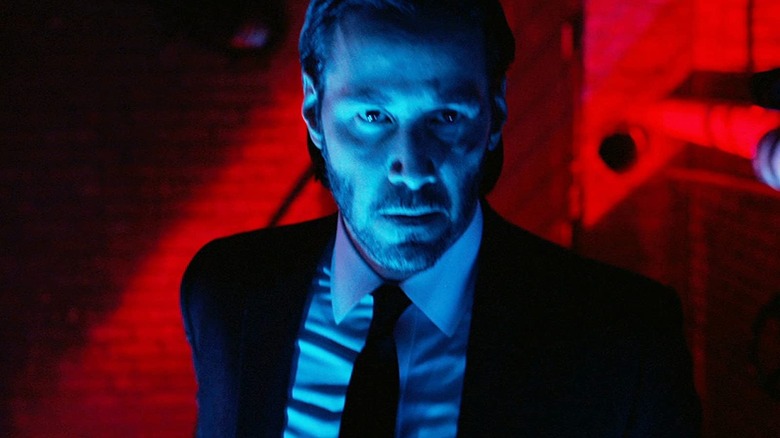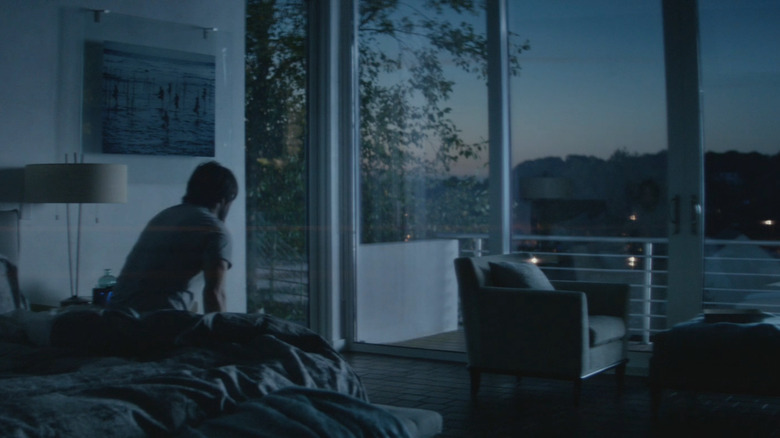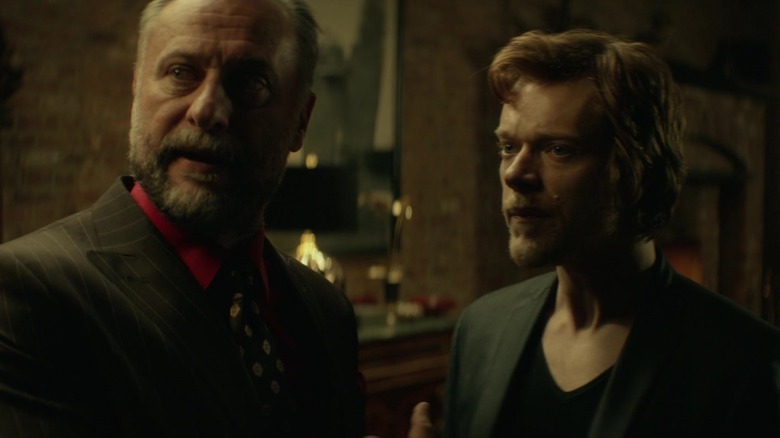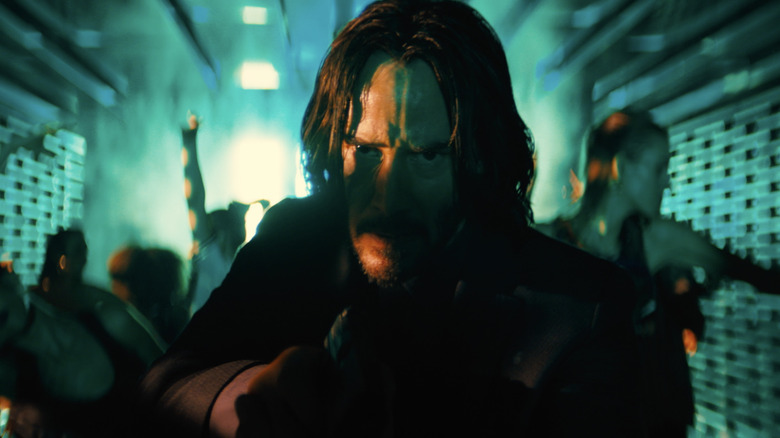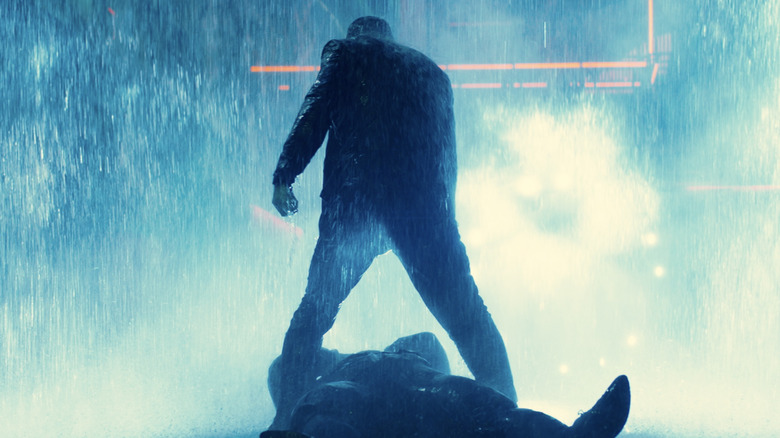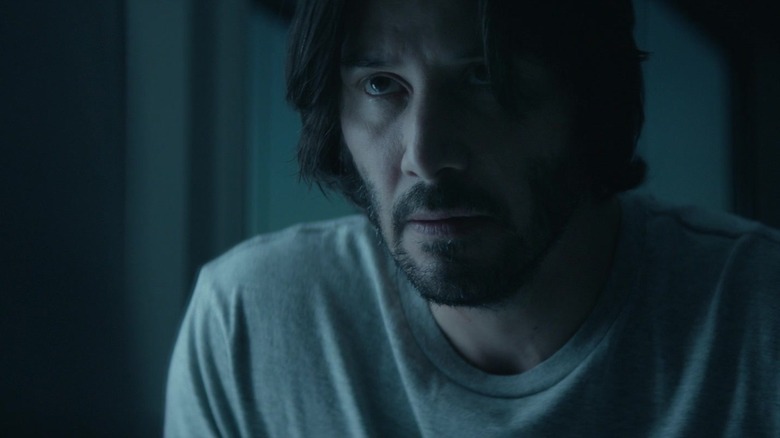The First John Wick Movie Is The Best Of The Series, And It's Not Even Close
In an industry obsessed with sequels and reboots, going against established norms is often a risky but rewarding approach. In 2022, Zach Cregger's "Barbarian," budgeted at $4.5 million, became a sleeper hit when its upending of horror movie tropes and unique blend of terror and comedy brought in $44 million at the box office. You would think such a stark contrast of tones would result in one undermining the other, but somehow it worked.
Eight years prior, Keanu Reeves was looking for something similarly unorthodox to jump-start his career. Since 1999's "The Matrix," he'd struggled to pick the right projects, with the blunder that was 2013's "47 Ronin" almost killing the star's career. Then, the script for "John Wick" came across his desk, and Reeves was drawn to what he referred to as a "full-blooded character" — a preternaturally skilled hitman feared by even the toughest of crime bosses. The actor praised screenwriter Derek Kolstad — who's currently producing the "John Wick" prequel-spinoff series "The Continental" — for his blending of "real world aspect[s]" and the "underworld of criminals," ultimately concluding that the script had "something fresh about it."
And it did. By 2014, audiences were growing weary of "gritty reboot" style action thrillers, inspired by the gloomy seriousness of Christopher Nolan's "Batman Begins" and the Bourne trilogy, which had revitalized the action genre with its sleek, kinetic combat and sober tone. But "John Wick" promised a new, bold, "Barbarian"-esque, melding of styles and subversion of action clichés. Kolstad's story, brought to life by former stunt coordinators and first-time directors Chad Stahelski and David Leitch, would indeed prove "fresh" enough to reinvigorate Reeves' career. Unfortunately, by the time "John Wick: Chapter 4" arrived, the franchise that grew out of that first film would get stale, even as box office sales soared.
Starting out slow
When "John Wick" debuted in 2014, it wasn't exactly a mega hit, but the film was well-received enough to gain a cult following via word-of-mouth. It brought in $14 million in its first weekend — double what it was projected to make. Not bad for a film that Variety noted was predicted to be "another nail in [Keanu Reeves'] career coffin." And it was well-earned. "John Wick" felt like a minor evolution in the action movie genre, combining multiple techniques and stylistic elements to create something that felt original yet indebted to action movie history.
When the film starts, you're drawn into an affecting depiction of grief, with Reeves' titular hitman introduced as a widower suffering in the wake of his wife's death. Don't get me wrong, I don't think "John Wick" is a nuanced and insightful exploration of grief, but Reeves shuffling through an oppressively sterile modern home alone, accompanied by little to no score, is effective at conveying his loneliness.
The minimal sound design in these moments is, again, nothing revolutionary, but shows a sensitivity on the part of Chad Stahelski and David Leitch. Every shuffle of a bed cover, slow sigh, and footstep dragged across tiled floor demonstrates the first-time directors' awareness of the importance of dynamics. Things are about to get extremely intense, but that eventual switch is made all the more impactful by these quiet opening moments, even if there is the regrettable "Fridging" element — a favorite practice of Christopher Nolan — whereby the dead wife trope is used to motivate the central male character.
With subsequent films in the franchise, audiences would be thrown right into the action, helping to emphasize the relentless struggle faced by John Wick, but sacrificing that interplay of tones that made the first film so intriguing.
The Greek Chorus
One of the most effective action movie tropes used by "John Wick" is what Sylvester Stallone referred to as the "Greek Chorus" technique. Back when "First Blood" was due to debut in 1982, Stallone stripped much of his dialogue from the edit in order to, as he told Howard Stern, "have other people talk about [Rambo]" instead of having the central character talk himself up. In "John Wick," we're treated to plenty of this, as everyone but Wick himself helps establish his standing as the legendary "Baba Yaga."
Much of that comes from Michael Nyqvist's Russian mob boss Viggo Tarasov, who warns his son about Wick being "the one you send to kill the f***ing boogeyman," and uttering that now legendary line about once seeing Wick "kill three men in a bar with a pencil." This all comes before we see the eponymous assassin demonstrate his elite skills, building a tension which is satisfyingly broken after he lays waste to the team of thugs sent to take him out in his own home.
There's a structure to the way this plays out. The reflective opening scenes showing John Wick's grief set the stage for a sudden and effective switch of tone when he turns his home into a battleground. Meanwhile, the "Greek Chorus" technique of having others talk up Wick's legend set the stage for him to spend the rest of the film proving that legend to be true, making for a satisfying fulfillment of the film's promise by the time the credits roll.
What's the point of the sequels?
In later entries, that same tension isn't there any more. We already know Wick is as capable as everyone claims, which takes a lot of the fun out of seeing him prove it. By the time you get to the action fantasia that is "John Wick: Chapter 4," there's obviously no need for any "Greek Chorus" technique. It's all become just an excuse for more expertly crafted combat, which is fun but not the same as the structure and cleverly balanced tones of the first movie.
That blend of the real and fantastical was so crucial. Once Wick goes from grieving widow to all-out badass and we're introduced to the underground world of hired hitmen, the color palette and lighting transform from drab, desaturated grays to the neon wonderland of Wick's nocturnal bloodbaths, depicting this hidden society as a dark fairytale realm. That color shift serves a purpose here. Whereas subsequent entries in the "John Wick" saga seem to bathe every possible set in neon for the sake of it, the neon-lit environs of "John Wick" serve to emphasize the excitement of delving into this secret world of assassins and organized crime. It's as if Wick comes alive once he returns to his violent ways.
Much like "Barbarian" and its incongruous comedic elements, this dramatic change of tone is risky because it could potentially undermine the seriousness of the film's first act. But it works not just as a refreshing rejoinder to the cold grittiness of action movies that came immediately before, but as a way of motivating the stylistic choices for the rest of the film. From "John Wick: Chapter 2" on, those gaudy hues just seem to be parodying the first entry without enhancing any real thematic or narrative purpose.
'Don't worry about plot'
What exactly changed after "John Wick," then? The first film told a cohesive story, by the end of which the titular anti-hero had claimed his revenge, leaving the creative team with the task of having to turn a story that was never designed as a franchise into just that. In doing so, Chad Stahelski — who was once Keanu Reeves' stunt double on "The Matrix" — told iNews that once he took on sole directing duties with the sequels, he basically decided to forgo much of what made the 2014 movie so interesting, saying:
"In the end me and Keanu talked and we said, 'What do we like about the first one? We like the guy, we like the world, we like that it's a fun action movie that goes to extremes. Don't worry about plot. Just stay with the guy, open up the mythology, push the action even further.'"
While plot has never been too much of a concern for the "John Wick" series, even in the first movie, there was at least enough of a narrative to the inaugural entry to give it a real sense of structure beyond a bunch of fights with some loose connective tissue. And with Reeves highlighting the "full-blooded" richness of his character as one of the things that drew him to the script, alongside the melding of "real world aspect[s]" and the "underworld of criminals," it seems strange to focus solely on mythology and action for the sequels — which arguably dispense with pretty much any of the "real world aspects" that made "John Wick" such a compelling mix of styles. The action movie majesty of the "John Wick" sequels is impressive, but it's less impactful when it's non-stop and not juxtaposed against anything else.
John Wick just wants to 'get this s*** over with'
Now that "John Wick: Chapter 4" has shattered franchise box office records, it seems I'm in the minority in my view of the franchise going downhill since the first movie. With each sequel, the series has seen box office earnings increase, to the point that with the fourth installment, "John Wick" has gone from surprise sleeper hit to genuine blockbuster franchise.
To be clear, I like the fourth film. I think it's a sprawling spectacle that clearly took a lot of technical skill and dedication to bring to fruition. As such, you could argue that rather than declining, the "John Wick" franchise has evolved to become something completely different to what it started as, and that's okay. Instead of having to make a name for itself with clever subversions of action clichés, it can now exist solely to be gazed upon as a pinnacle of action movie combat.
But there's part of me that feels we've missed out on a franchise that could have proven audiences will respond to more than just cool fight scenes and increasingly complex lore. The concept of a hitman that even hitmen are afraid of is so simple, but it's a compelling one nonetheless. It feels like with each subsequent film in the "John Wick" series, that concept has been more and more overlooked, to the point that by "Chapter 4," Wick just seems to be going through the motions of battling faceless thugs without any of the intimidating energy that made him a compelling character in the first place. He's less of a boogeyman working in the shadows and more some tired dude who's ready to, as Donnie Yen's character says in the film, "get this s*** over with." And I'm with him.
